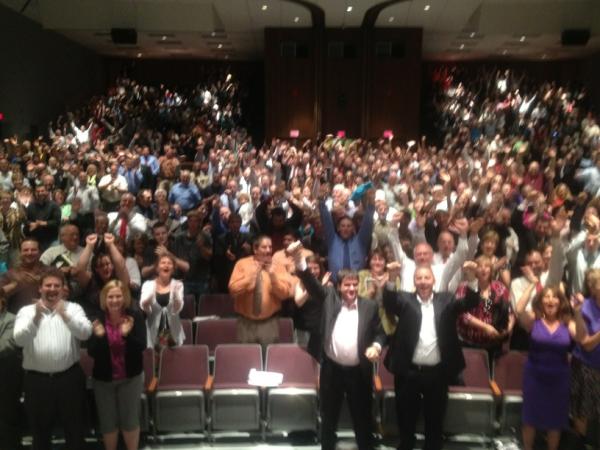The late Murray Rothbard was a polymathic genius. I have read few authors who have studied and understood history, economics, philosophy, sociology, liberty, and power, in as entertaining and informative a manner. I find that, even when I disagree with Rothbard, he still makes me think. In truth, isn’t this the goal of all reading? I don’t read to believe everything the author writes; rather, I read to sharpen myself on the iron thinking of other great minds. Unfortunately, our school systems, newspapers, magazines, television sets, and radio stations are all geared to tell you what to think (propaganda) instead of teaching you how to think (education).
After reading Rothbard’s analysis of the Revolutionary War from his book Conceived in Liberty and the role of intellectuals in the conflict, it became crystal clear to me who the court intellectuals are today. Invest the time to read Rothbard’s analysis of 18th century America for yourself. See if you can identify some of the court intellectuals today who share the ruling statist ideology in our society. Likewise, think of some of the anti-statist authors and organizations who faithfully teach our English heritage from the Magna Carta, Petition of Rights, and Bill of Rights. These great documents protected the citizens against un-checked statist power, helping create a society ruled by law to protect life, liberty, and property.
Did anyone ever study these three documents in high school? How about college? Amazingly, three off the most precious documents in the history of the English-speaking people that, along with the King James Bible, flowered freedom to a level previously unknown throughout the world is largely forgotten. Even though these documents produced a level of liberty that was the envy of every other European nation. Indeed, the West would not even be conceivable without these documents. However, if this is true, then why aren’t these great truths shared in every school in every English speaking country? Moreover, is there anything that English speaking citizens from around the world can do about this catastrophic, at least from a liberty perspective, series of egregious events?
Call me a dreamer, but if only there were communities who inspired people to begin a self-directed education. If only people began reading, learning, and sharing from the original sources with one another to learn the great truths of freedom by working around society’s purveyors of propaganda. 🙂 Imagine the impact of millions of people taking the Mental Fitness Challenge and launching a self-directed education into their personal lives while associating with others taking the same journey? Yes folks, the road ahead will be challenging; however, great leadership is only revealed when the obstacles encountered cannot be resolved with anything less. Like my friend Chris Brady says: Today’s the day!
Sincerely,
The essence of the state throughout history is a minority of the population, constituting a power elite or a “ruling class,” governing and living off the majority, or the “ruled.” Since a majority cannot live parasitically off a minority without the economy and the social system breaking down very quickly, and since the majority can never act permanently by itself but must always be led by an oligarchy, every state will subsist by plundering the majority in behalf of a ruling minority. A further reason for the inevitability of minority rule is the pervasive fact of the division of labor: the majority of the public must spend most of its time going about the business of making a living. Hence the actual rule of the state must be left to full-time professionals who are necessarily a minority of the society.
Throughout history, then, the state has consisted of a minority plundering and tyrannizing over a majority. This brings us to the great question, the great mystery, of political philosophy: the mystery of civil obedience. From Etienne de La Boetie to David Hume to Ludwig von Mises, political philosophers have shown that no state—no minority—can continue long in power unless supported, even if passively, by the majority. Why then does the majority continue to accept or support the state when it is clearly acquiescing in its own subjection? Why does the majority continue to obey the minority?
Here we arrive at the age-old role of the intellectuals, the opinion-molding groups in society. The ruling class—be it warlords, nobles, bureaucrats, feudal landlords, monopoly merchants, or a coalition of several of these groups—must employ intellectuals to convince the majority of the public that its rule is beneficent, inevitable, necessary, and even divine. The leading role of the intellectual throughout history is that of the court intellectual, who, in return for a share of, a junior partnership in, the power and pelf offered by the rest of the ruling class, spins the apologias for state rule with which to convince a misguided public. This is the age-old alliance of church and state, of throne and altar, with the church in modern times being largely replaced by secular intellectuals and “scientific” technocrats.
When state rulers act, then, to use and aggrandize state power, their primary motivation is economic: to increase their plunder at the expense of the subject and the taxpayer. The ideology that they profess and that is formulated and spread through society by the court intellectuals is an elaborate rationalization for their economic interests. The ideology is the camouflage for their looting, the fictitious clothes spun by the intellectuals to hide the naked plundering of the emperor. The economic motive behind the ideological garb of the state is the heart of the issue.
But what of the actions of the rebels against state power—those infrequent but vital situations in history when the subjects rise up to diminish, whittle away, or abolish state power? What, in short, of such great events as the American Revolution or the classical liberal movements of the seventeenth and eighteenth centuries? Of course, an economic motive exists here, too, in this case one of defending the private property of the subjects from the depredations of the state. But our contention here is that, even when conjoined as in the American Revolution, the major motive of the opposition, or of the revolutionaries, will be ideological rather than economic.
The basic reason for this assertion is that the ruling class, being small and largely specialized, is motivated to think about its economic interests twenty-four hours a day. Manufacturers seeking a tariff, merchants seeking to cripple their competition, bankers looking for taxes to repay their government bonds, rulers seeking a strong state from which to acquire revenue, bureaucrats wishing to expand their empire—all of these are professionals in statism. They are constantly at work trying to preserve and expand their privileges. Hence the primacy of the economic motive in their actions. But the majority has allowed itself to be misled largely because its immediate interests are generally diffuse and hard to observe, and because the majority comprises not professional “antistatists” but people going about their business of daily living.
What can the average person know of the arcane processes of subsidy or taxation or bond issue? Generally, he is too wrapped up in his daily life, too habituated to his lot after centuries of state-guided propaganda, to give any thought to his unfortunate fate. Hence, an opposition or revolutionary movement, or indeed any mass movement from below, cannot be primarily guided by ordinary economic motives.
For such a mass movement to form, the masses must be fired up, must be aroused to a rare and uncommon pitch of fervor against the existing system. But for that to happen, the masses must be fired up by ideology. Only ideology, guided either by a new religious conversion or by a passion for justice, can arouse the interest of the masses (in the current jargon, “raise their consciousness”) and lead them out of the morass of daily habit into an uncommon and militant activity in opposition to the state.
This is not to say that an economic motive—for example, a defense of their property—does not play an important role. But to form a mass movement in opposition means that the people must shake off their habits, their daily mundane concerns of several lifetimes, and become politically aroused and determined as never before in their lives. Only a commonly held and passionately believed-in ideology can perform that role. Hence our conclusion that a mass movement like the American Revolution must be centrally motivated by a commonly shared ideology.
How then do the masses of subjects acquire this guiding and determining ideology? By the very nature of the masses, it is impossible for them to arrive at such an opposition or revolutionary ideology on their own. Habituated as they are to their narrow and daily rounds, uninterested in ideology as they normally are, it is impossible for the masses to lift themselves up by their own bootstraps to hammer out an ideological movement in opposition to the existing state.
Here we arrive at the vital role of the intellectuals. Only intellectuals, full-time (or largely full-time) professionals in ideas, have the time, the ability, and the inclination to formulate an opposition ideology and then to spread the word to the people. In contrast to the statist court intellectual, whose role is a junior partner in rationalizing the economic interests of the ruling class, the radical or opposition intellectual’s role is the centrally guiding one of formulating the opposition or revolutionary ideology and then of spreading the ideology to the masses, thereby welding them into a revolutionary movement.
An important corollary: in weighing the motivations of the intellectuals themselves or even of the masses, it is generally true that setting oneself up in opposition to an existing state is a lonely, thorny, and often dangerous road. It is usually directly in the economic interests of the radical intellectuals to allow themselves to “sell out,” to be co-opted by the ruling state apparatus. The intellectuals who do choose the radical opposition path, who pledge—in the famous words of the American revolutionaries—“their lives, their fortunes, and their sacred honor,” can scarcely be dominated by economic motives; on the contrary, only a fiercely held ideology, centering on a passion for justice, can keep the intellectuals to the rigorous path of truth. Hence, again, the likelihood of a dominant role for ideology in an opposition movement.
Thus, statists tend to be governed by economic motivation, with ideology serving as a smokescreen for such motives, while libertarians or anti-statists are ruled principally and centrally by ideology, with economic defense playing a subordinate role. By this dichotomy we may at last resolve the age-old historiographical dispute over whether ideology or economic interests play the dominant role in historical motivation.










